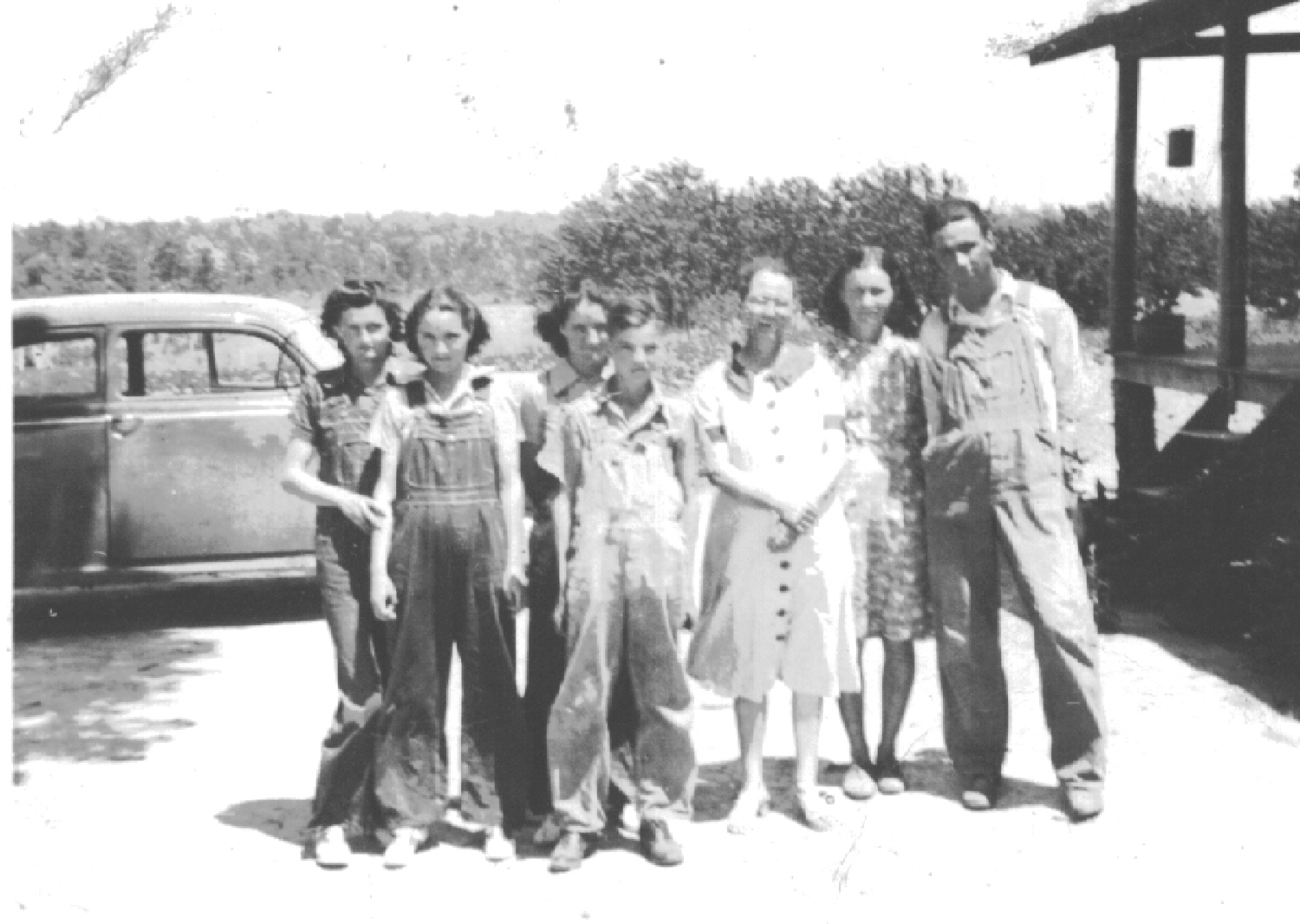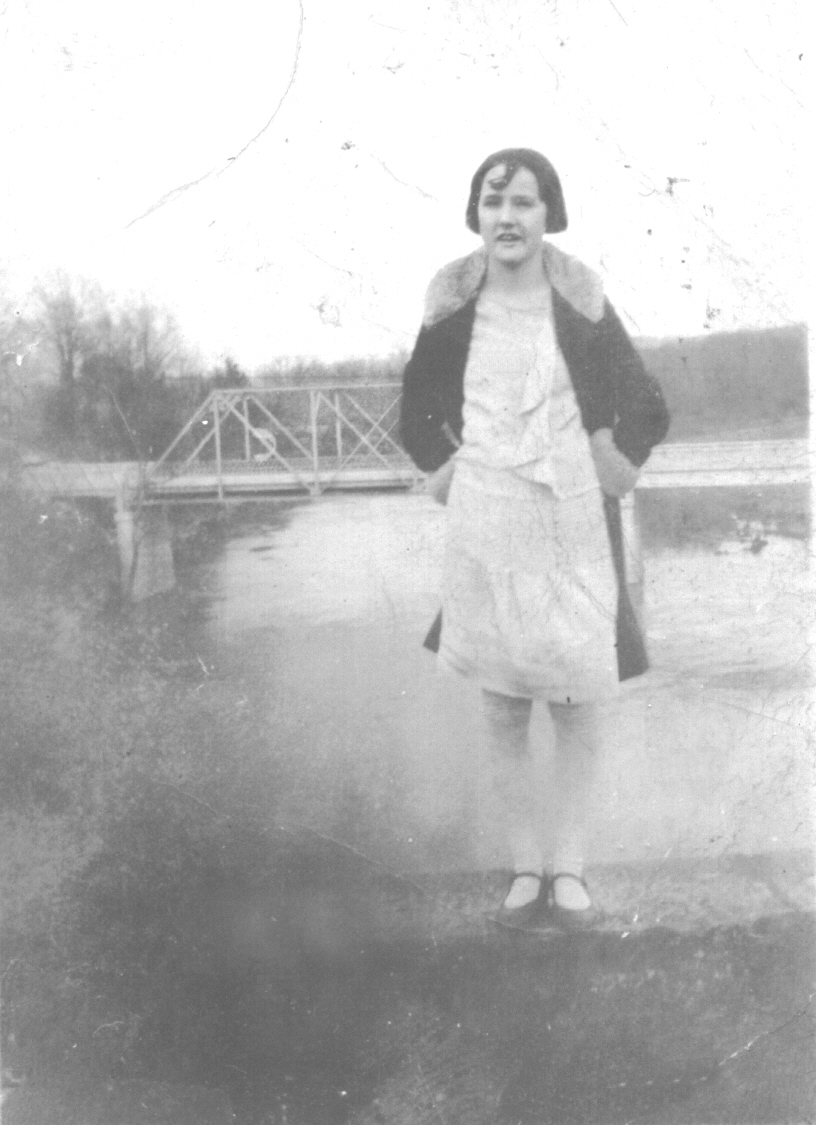
Elizabeth, Dora, Nora, George W., Mama Weir, Evelyn, Comer
The Story of my Life
Louise Virginia (Weir) Frasier
| Home | Introduction | Preface | Chapters | Do You Remember? | Stuff | Contact |
Chapter IX
|
T |
he depression years—but we went to school and we still had some fun—for we were all together and we really did have a good father and mother. But Mama was a proud woman and it must have hurt her terribly for us to be share-croppers.
Why don’t I talk about share-cropping during the depression years? Papa furnished everything to farm except the land, and we got two-thirds of the cotton and one-half of the corn, and we could have a garden. Share-cropping was a form of slavery. We really and truly sold our souls to the company store. The land-lord furnished credit to live on while the crops were being made. In Papa’s case, $30 a month.
When the cotton was picked, the land-lord was paid and there would be a couple of hundred dollars left over. But, not enough to feed us through the winter, so the men folks had to hew cross-ties, or load cross-ties on the train, or cut or load cord-wood.
Cross-ties were fifty cents each and they had to be sawed the correct length and then hewn with a draw axe. That’s the reason that I didn’t want a class ring which cost $12.50. I saw Papa down on his knees hewing cross-ties. Twelve dollars and fifty cents would have been twenty-five days work for him.
Poor Papa! But he never showed any bad temper. He didn’t seem to care too much for the younger kids, but I’m sure that he did. He was in constant pain from the skin cancer on his nose. I’ve seen him eat aspirin out of the bottle by the handful.
Papa also worked at the grist mill for fifty cents a day and for six weeks in the fall he ran the cotton gin—not his any more, but Mr. Curry’s. He also got fifty cents a day for that. That was for fourteen or fifteen hours a day. Days were generally from sun-up till sun-down.
Mostly corn was ground at the grist mill in Flintville. The mill had a millrace—a ditch with cement sides—that was always full of water. There was a big mill wheel about sixteen to eighteen feet tall. The wheel had spokes that were really buckets. The water fell on the wheel, the buckets filled with water, and the wheel turned. The wheel was fastened to a drive shaft that turned the grist, or the mill, inside that ground the corn.
One spring when Papa was working at the mill I was there and he told me to look about the wheel in the mill race. There was a bunch of snakes all tied up together. I’d say there were about fifty to sixty snakes. They hit the mill wheel and snakes went flying everywhere! Papa said they were harmless water snakes and he didn’t bother them.
Since Papa
couldn’t hear and had his pride stripped by being a share-cropper he never went
to church after we moved to Tennessee in 1927. Mama was a society person in
Alabama, but after we moved to Tennessee no one knew her unless they needed
someone to sit with the sick, to help deliver a baby, or to lay out the dead.
 |
"We girls wore overalls to the
fields" Elizabeth, Dora, Nora, George W., Mama Weir, Evelyn, Comer |
A day on the farm in the 1920’s and 1930’s went like this. Everybody was out of bed by 5 o’clock. Papa would get up and build a fire in the Home Comfort Range stove. The stove had a reservoir for water on one side and a warming closet at the top. He put on the coffee. You never washed the coffee pot or emptied the old grounds. The pot was emptied and rinsed once a week. No kids drank coffee and Mama didn’t either.
We ate breakfast, most of the time it was biscuits with butter and brown sugar. We never had gravy, although a lot of people did. We had syrup and jelly. Mama’s jelly never jelled for there was no Sure Gel. While the biscuits were baking, I milked the cows—generally two. Papa fed the stock and hogs. I started milking when I was twelve years old. Mama and I were the only ones who knew how to milk. I guess later the other girls learned, but Lillian never did.
We’d put on our work clothes when we got up and by good daylight, we were in the fields, hoeing. Comer and Buford did the plowing but later after the boys married, we girls also plowed. At eleven o’clock Mama would call us to the house for dinner. Then we ate our big meal of the day—very little meat, but always plenty.
After dinner everyone got a book or paper and read until one o’clock, then back to the field until the sun would start down. Then we went back to the house and took care of the milking and other chores. Our supper usually consisted of corn bread and milk.
The girls did the dishes at night. Mama did the cooking, dishwashing (except at night), and the laundry. Of-course she did the laundry by hand. She had a big black pot to boil the clothes in. She had no detergent or bleach. She used home-made lye soap and bluing. Some people battered the clothes—put them on a solid place, generally a stump and beat them with a battering stick. Mama never did. We Weir girls wore overalls, other girls didn’t. We had kerosene lamps and they were not romantic, only dark! We were all in bed by 9 o’clock.
The last of June the crops were laid by, work done until harvest time. For about ten weeks we went to school and the middle of September school was dismissed so everyone could harvest the crops. The Weir girls picked cotton and one year Papa planted cowpeas. We had to pick those and how we hated that! The peas got ready to pick while it was still very hot and they stuck you through the bag. We never hayed or pulled corn. Corn was never a money crop. You grew enough corn to make cornmeal for corn bread and to feed hogs and mules—so the mules would be able to pull the plow so you could raise enough corn to feed them so they could pull the plow the next year. Ha!
About the middle of September, the cotton would be ready to start picking. Everyone got a new sack. It was about five feet long with a strap to go over the shoulder. The end of the sack dragged on the ground. A sack would hold around eighty pounds. Different people picked different amounts. I could pick 400 pounds a day and so could Ola. Papa and Comer could never pick over 100 pounds.
The wagon was in the field with the scales. Each sack of cotton was weighed and when you had fifteen hundred pounds, more or less, it was taken to the gin where the seed was picked out and trash blown out. The cotton went down a shoot to the baler where sacking was wrapped around and tied with steel bands. A finished bale weighed about 500 pounds.
We would be in the fields by good sun-up. Dew would be heavy and your shoes and pants legs got soaking wet. The leaves would be turning, the air would be crisp, and sounds carried for miles. Sometimes you would find a watermelon in among the cotton plants, break it open and with your dirty hands, take out the heart and eat it. Or you might find a tomato plant after the frost that had tomatoes under the grass or cotton stalks—good. Oh, how I wish I had a tomato like that!
Money was scarce during the depression, but it would buy a lot of things. I have a shopping list that Lillian gave to Comer in 1929. He was going to the post office on a horse. Lillian gave him seven cents and three eggs, which were one cent each. The list was:
1 box salt
¼ lb. box crackers
1 box baking soda
1 box matches
1 spool thread
½ yd. material “to match sample”
and if any was left over, to buy stick candy. Comer said, “I’ll be darned if I
do it.”
 |
Louise Virginia Weir |
Sometimes, having to trade farm produce for what we needed could be a problem. One day I had to have a new dress, and of-course if I got a new dress then Mary Will had to have one too. Mama said, “Well, I have those six plymouth rock hens. They should bring enough to buy the material, buttons, thread, and the fifty cents to pay the woman for making them— twenty-five cents each.”
The men were all working and we had to get the hens to the store—six of them weighing an average of six pounds each. Mary Will said she was not about to tote no old hens to the store. I tried Elizabeth and she said no, it was too hot. I could generally get Evelyn to do anything (If she didn’t, I’d sic Ted on her—for some reason he hated her). But that day she said she would not go with me. She was really to little to tote a heavy hen anyway.
Mama tied the hens’ feet together, three hens to the bunch. I carried three hens in each hand by the tied feet. Hot! And my arms were almost pulled out of the socket. I would have done OK except that my boyfriend was visiting his sister in Flintville.
His name was Erby Lee and he lived in St. Louis. He had just arrived the night before for a visit with his sister. When I was almost to the store, I met him going to my house. I was embarrassed at first, but then I remember, If you laugh at yourself, people laugh with you. But if you don’t laugh, people laugh at you. A big difference!
So I said, “I’m so glad to see you for I’m so tired that I’m going to be sick, and I’m afraid that these hens are going to be sick at the wrong end.” Then he took three and I kept three. We went into the store with them and just as he handed his to be weighed, one was sick at the wrong end! Ha! Ha! A big romance over before it started!
The material that I bought was linen, light green for me and blue for Mary Will. It cost ten cents a yard and the pattern called for three yards. That was six yards of material, two spools of thread, and eight buttons—four for each. Then Mama told the woman to make Mary Wills first. Oh well. Mary Will and I wore one another’s dresses but not shoes. Our feet were the same size, but she always ran hers over the first time she wore them. I sound like I was picked on, don’t I? But I was the oldest and since I wasn’t so fancy anyway, I really didn’t mind doing the nasty stuff.